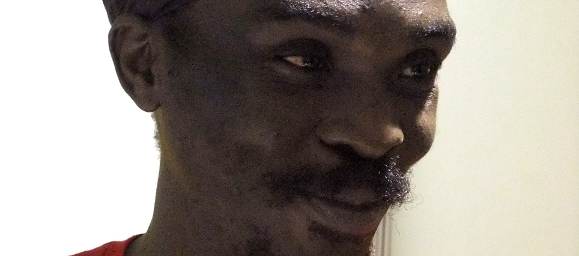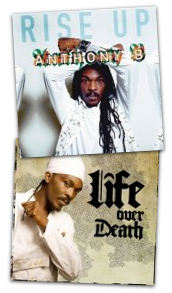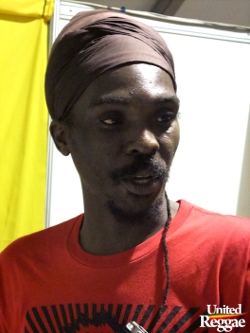Articles about reggae music, reviews, interviews, reports and more...
Interview: Anthony B at Rototom Sunsplash 2010
- Home
- Articles
- Interviews
- Interview: Anthony B at Rototom Sunsplash 2010

Interview: Anthony B at Rototom Sunsplash 2010
On Buju: "If you are a criminal and the law holds you as a criminal then they are going to try you as a criminal. They don’t need time to investigate whether you are a criminal – they hold you as a criminal."
Sampler
Strident voiced deejay Anthony B was one of the major players in reggae and dancehall’s return to roots and culture in the 1990s. Born in Clarks Town, Trelawny Parish, a religious and musical upbringing and an uncompromising temperament led to his finding of Rastafari and a recording career that took off, like that of fellow conscious pioneer Everton Blender, under the tutelage of Star Trail’s Richard Bell. Since then, like his hero Peter Tosh, he has followed his own compass, releasing through a variety of producers (including Europe’s Frenchie with whom he has cut no fewer than four albums) and using both traditional record companies and digital business models. In 2009 he closed the final Italian Rototom Sunsplash festival so in 2010 it was only fitting that he be the first headlining Jamaican artist at its new home in Spain. Angus Taylor spoke to him shortly after he stepped off the stage, about his music, the festival’s exodus from its homeland, and the incarceration of his friend Buju Banton, whose trial is, at the time of writing, still underway…

On stage at Rototom you talked about your personal philosophy of never giving up on life, even when setbacks get you down. Would you say this applies to the festival being kicked out of Italy and starting again in Spain?
I’ve got to give a lot of love to the organisers. Sometimes when things like this happen in life people let go and give up and forget about it. But I saw that they persisted and picked themselves up. That’s a part of our message in the music. When rough times and tough times come you must know that there are bumps because that’s a part of life. You can’t just get up every day and raise the flags because sometimes it’s going to tingle a little bit! It felt great and looking at the crowd I could see the festival got a warm welcome.
 When rough times and tough times come you must know that there are bumps because that’s a part of life.
When rough times and tough times come you must know that there are bumps because that’s a part of life.
You play a lot of European rhythms on stage and you seem to have embraced Europe in your music.
Yeah. What I’m trying to do in this time is show the people that we are not invaders but we are appreciators. We are not victors – we are bringing people together. Because if you can appreciate me, I can appreciate you. That’s what love is built upon.
One European producer you have worked with more than any other is Frenchie. What makes you such a good team?
Because we’ve become like brothers. From the first time we did a song together I understood he was a producer who is trying to keep the music real. Also we share ideas. So he would call me in the middle of the night and say, “Anthony, listen to this! What do you think? I want you to make a song about stopping the violence in the street!” So with producers like this, he is giving an insight, just like how you are giving me an insight now. So it’s a perfect match.
You’re also very open to different ways of delivering and marketing your music:  from big record companies like VP for your 2009 album Rise Up to digital downloads for your 2008 album Life Over Death to even the grass roots like selling your album right here at the festival. Why is this important?
from big record companies like VP for your 2009 album Rise Up to digital downloads for your 2008 album Life Over Death to even the grass roots like selling your album right here at the festival. Why is this important?
Because as Bob Marley said to us you have to be open to new generations and new ideas. And if we don’t embrace our kids then when the time comes we are going to be in problems! You understand? Because when we get older we get slower and they take our spot! So we have to embrace them from early, so then, in that time of life when we need them the most, they can totally take time out of their busy schedules! So embracing new ideas is what helps the music transcend from one generation to the next.
 Embracing new ideas is what helps the music transcend from one generation to the next.
Embracing new ideas is what helps the music transcend from one generation to the next.
Finally, you’ve been playing your tune Free Up The General on stage and talking about Buju being in prison. Tell me about that…
He is a friend of mine and the justice needs to play out. Because for me the justice hasn’t played out yet. For me, for a person to be in prison for a year there must be some form of charge and going in front of the judge. I’ve been arrested before in life and when I went to the court the judge said to me that the cops have the right to arrest anybody and that’s why there is a court system. Once you come in front of a court, that is where you are a guilty person or a not guilty person. And if it takes one year to take a person in front of the court in this modern time and modern system, to anyone in this world it would look like there is something tricky going on.
 If it takes one year to take a person in front of the court in this modern time and modern system, to anyone in this world it would look like there is something tricky going on.
If it takes one year to take a person in front of the court in this modern time and modern system, to anyone in this world it would look like there is something tricky going on.
You must understand that I don’t want to play a part like I’m the law giver or the law maker but looking at it from that point of view there is something tricky. If you are a criminal and the law holds you as a criminal then they are going to try you as a criminal. They don’t need time to investigate whether you are a criminal – they hold you as a criminal. And saying that somebody is a criminal but you need two years to investigate if they are – that doesn’t seem like you are holding them as a criminal then.
 Anything could happen to me, and I would like not somebody to just overlook and give up and say I’m a guilty person. There are a lot of people that do things and then we hear ten years down the line that they are not guilty. Marcus Garvey was charged in America and deported back to Jamaica and in my own time I have lived to hear that in America Marcus Garvey was cleared of all criminal charges. That means it took 40 years for the people in America to know that Marcus Garvey was not guilty. So sometimes you must understand why we don’t just want to give up on our brother and say, “OK, he did this and it’s wrong” and wait until the justice play out. Me, I don’t believe in the justice if we start to give up on our brother so that’s why I keep pushing on.
Anything could happen to me, and I would like not somebody to just overlook and give up and say I’m a guilty person. There are a lot of people that do things and then we hear ten years down the line that they are not guilty. Marcus Garvey was charged in America and deported back to Jamaica and in my own time I have lived to hear that in America Marcus Garvey was cleared of all criminal charges. That means it took 40 years for the people in America to know that Marcus Garvey was not guilty. So sometimes you must understand why we don’t just want to give up on our brother and say, “OK, he did this and it’s wrong” and wait until the justice play out. Me, I don’t believe in the justice if we start to give up on our brother so that’s why I keep pushing on.
 It took 40 years for the people in America to know that Marcus Garvey was not guilty.
It took 40 years for the people in America to know that Marcus Garvey was not guilty.
[Editors note: To our knowledge Marcus Garvey was never officially cleared of mail fraud charges. However, his sentence was commuted, he was made a National Hero of Jamaica, and is widely believed to be innocent today]
Read more about this topic
Read comments (2)
| Posted by Nabby Clifford on 09.24.2010 | |
| AI BROTHER IS THIS SUCCESS | |
| Posted by Ras Tim on 10.23.2013 | |
| l n I believe that a Person is Innocent untill Proven Guilty...Marcus Mosiah Gravey was never guilty,he was charged based on Curcumstial Evidence because he was a black man...ever since then,the World has a very bad percetion about this.I n I Black man will alwez be the first suspect....! Jah live and Protect I n I....! | |
Comments actually desactivated due to too much spams
Browse by categories
Recommended Articles
Latest articles
Recently addedView all
© 2007-2025 United Reggae. All Rights Reserved. Reproduction in whole or in part is prohibited. Read about copyright
Terms of use | About us | Contact us | Authors | Newsletter | A-Z














